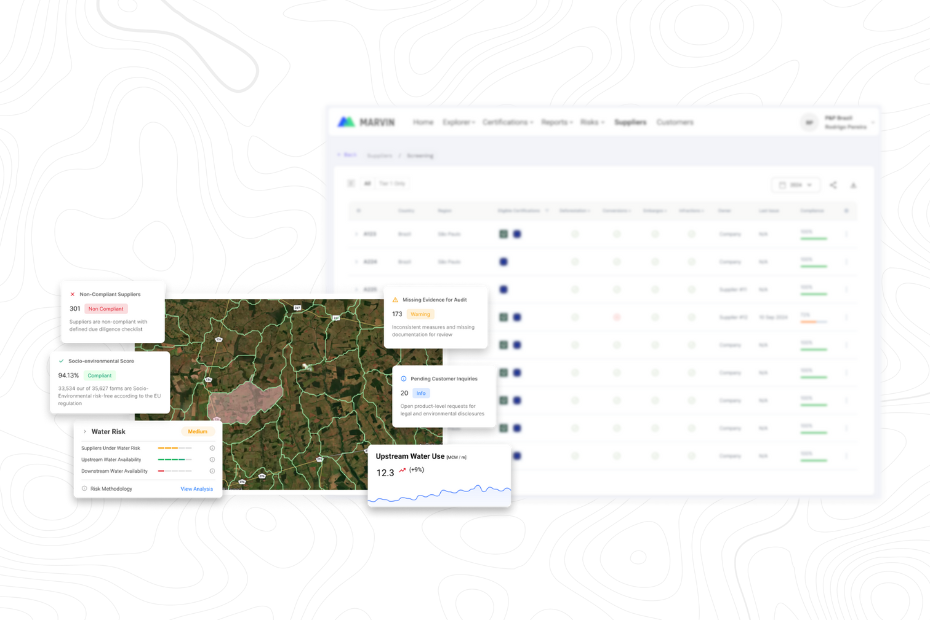Resource Library
Unlocking Biofuel Potential Through Trust, Technology, and Compliance and the Role of Brazil
Global biofuel demand is soaring, and certification is now a market imperative. With AI and blockchain transforming compliance, Brazil has a chance to lead—or risk falling behind. Explore the economic stakes, regulatory challenges, and tech solutions driving the future of sustainable fuels. 🚀 Read more.
Unlocking Biofuel Potential Through Trust, Technology, and Compliance and the Role of Brazil

A Defining Moment for Biofuels
The world is running on borrowed time when it comes to decarbonization. Airlines, shipping fleets, and industrial giants are scrambling to meet net-zero targets, yet one major bottleneck remains—there isn’t enough certified sustainable biofuel to meet demand.
For Brazil, one of the world’s top producers of agricultural commodities, this isn’t just a challenge; it’s a once-in-a-generation opportunity. But to fully capitalize on it, the industry must solve traceability, compliance, and certification hurdles—challenges that are increasingly being addressed with AI, blockchain, and geospatial intelligence.
With demand for biofuels projected to grow from 175 billion liters in 2023 to over 280 billion liters by 2035 (IEA Bioenergy, 2025), securing compliance, traceability, and certification will determine who dominates this market and who gets left behind.
Regulatory frameworks like ISCC EU, ISCC PLUS, CORSIA, EU RED II, US RFS, and RenovaBio are no longer just checkboxes—they’re entry tickets to global markets. Without robust verification, trusted auditors, and a transparent supply chain, producers risk missing out on billions in market opportunities.
So, the question is clear: Will Brazil lead the charge in certified sustainable biofuels, or will compliance gaps hinder its global competitiveness?

The Biofuel Value Chain and Certification Entities
A successful certification framework depends on a well-coordinated value chain, which includes key stakeholders such as:
- Producers & Growers Farmers and landowners cultivating biofuel feedstocks like sugarcane, soy, palm oil, and maize.
- Processors & Refiners Companies transforming raw materials into biofuels, ensuring compliance with sustainability criteria.
- Traders & Distributors Entities handling logistics, warehousing, and bulk shipments of certified products.
- Certification Bodies Independent organizations such as ISCC, RSB, and Bonsucro, which validate sustainability claims and issue compliance certifications.
- Regulators & Market Authorities Entities such as EU RED II, RenovaBio, and CORSIA, which define compliance frameworks and carbon credit mechanisms.
- End Users Aviation, maritime, and industrial sectors integrating biofuels into their decarbonization strategies.
Ensuring traceability and compliance at every stage of the value chain is essential to avoid penalties and maintain access to regulated markets (ECA Biofuels Report, 2016).

Brazil’s Biofuel Market: An Expanding Opportunity
Brazil’s biofuel industry already commands global influence, yet the next frontier lies in certified sustainable biofuels. Key drivers include:
- Regulatory Expansion: The Brazilian carbon compliance market is evolving, creating incentives for companies to certify and trade carbon credits efficiently (RenovaBio, 2024). Additionally, Brazil has now established a regulated carbon market to further accelerate decarbonization and emissions reductions in key industries, including biofuels (Brazilian Government, 2024).
- Export Market Access: European (EU RED II, ISCC) and North American (RFS, 45Z tax credit) frameworks require certified supply chains for compliance (ISCC EU, 2024).
- Supply Gaps: SAF demand is expected to increase dramatically by 2030, while feedstock availability remains constrained (Consultancy.eu, 2024).
- Sustainable Marine Fuel Mandates: The FuelEU Maritime regulation is setting ambitious greenhouse gas intensity limits on maritime fuels, increasing demand for certified low-carbon biofuels in global shipping (European Commission, 2023).

Certification Costs and Economic Impact
Certification and compliance come at a cost. Studies estimate that:
- Small enterprises face an average €50,000 in annual compliance costs, while large firms can see costs exceeding €1.2 million (WWF UK, 2022).
- Annual ongoing costs for compliance range between 0.74% and 0.05% of revenue, depending on company size and sector.
- Blockchain and AI technologies have the potential to reduce administration costs by streamlining risk assessments and supply chain monitoring (Chain Reaction Research, 2020).

Marvin: A Proven Solution for Certification and Governance
Marvin is delivering a market-proven solution that helps companies navigate complex certification frameworks, optimize governance, and unlock financial value from trade and compliance. By integrating non-fungible authentication technology, AI-powered decarbonization simulations, and automated customs controls, Marvin ensures full supply chain transparency, reduces compliance costs, and accelerates regulatory approval processes. Our platform enables partners to:
- Automate compliance workflows for ISCC, RenovaBio, CORSIA, and EU RED II.
- Reduce audit costs by leveraging satellite and AI-driven verification.
- Streamline chain of custody tracking with real-time data authentication.
- Enhance carbon credit monetization through integrated emissions reporting.
- Run AI-driven financial simulations to quantify the economic impact of decarbonization strategies.
- Enable automated customs clearance to ensure compliance with import/export regulations in global markets.
🚀 The future of sustainable fuels belongs to those who can certify, authenticate, and scale with precision. Will Brazil lead the way?
Sources Used
- European Commission, FuelEU Maritime (2023)
- Consultancy.eu, SAF Demand Forecast (2024)
- RenovaBio, Brazilian Carbon Compliance (2024)
- Brazilian Government, Regulated Carbon Market (2024)
- WWF UK, Compliance Costs (2022)
- Chain Reaction Research, AI and Blockchain in Compliance (2020)

Our Latest Resources
Discover how AI, geospatial tech, and evolving certification systems are reshaping forestry compliance in the face of EUDR, CSDDD, and global trade uncertainty.

